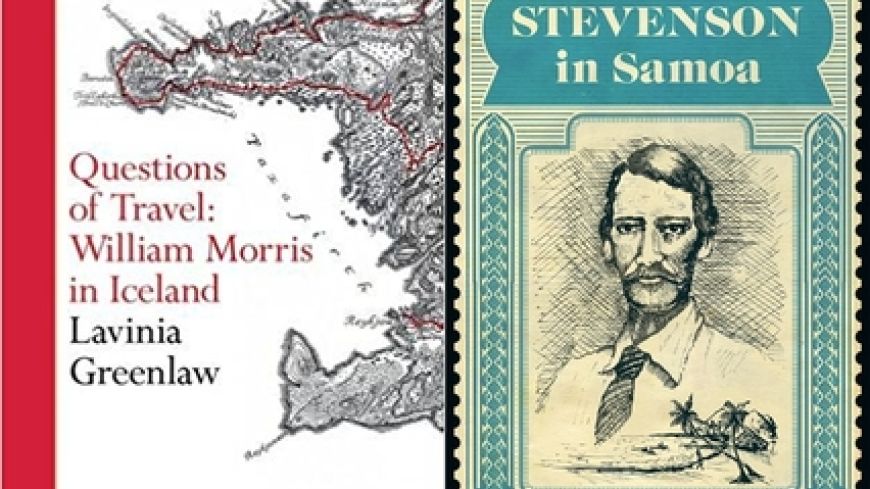
The Bosco Theatre is like a vintage circus tent, where writers, not animals and clowns, will entertain and amuse the audience, seated on (rather uncomfortable), bench seats.
The novelist and playwright James Runcie introduced this event the contrasting tales of escape, travel and the imagination, by both the Arts and Crafts designer William Morris in Iceland, and the final years in the life of Robert Louis Stevenson on Samoa. Instead of twenty minutes with each author and then questions, Runcie explained that he would “mix it up ... but it may go disastrously wrong.”
Starting with “Robert Louis Stevenson in Samoa,” Joseph Farrell explained how the classic novels by RLS had inspired him since childhood. When as a visiting Professor teaching at the University of Melbourne, he decided to take a trip to Samoa, although the young travel agent queried this: "Why Samoa? Fiji would be better." Not having heard of RLS, she googled the name, “Oh, he wrote Treasure Island!”
And so Farrell arrived on Samoa in search of Stevenson. It was in 1888 when he sailed from San Francisco across the Pacific to the Marquesas Islands, cruising the South Seas for two years until he found his own Treasure Island, Samoa.
The first experience can never be repeated, the first love, the first sunrise, the first South Sea Island are memories apart and touched by a virginity of sense.” RLS arriving at Nuku Hiva.
We then hear in detail how, as Tusitala, the Teller of Tales, RLS integrated fully into the local culture, society and politics, all influencing his work.
From the South Pacific we travel to the North Atlantic, as Runcie introduced the award wining poet, novelist and film-maker, Lavinia Greenlaw who followed in William Morris footsteps to Iceland - “I have an interest in things north”, she admits. As a literary response to Morris’s journals of the 1870s, “Questions of Travel,” combines excerpts from his observations printed on one page and opposite, her memoirs and prose poems.
Inspired by Morris's adventurous spirit, Lavinia comments on our urge today, to "go elsewhere. ..if we travel to escape ourselves .. we forget that we have to take ourselves on the journey”. Linking to entries in Morris's journals, setting off on his trip, she echoes his views on the anciticipation, the fidgety excitement, but also the fear the boat will sail without you. We are then treated to a charming, short, dramatic performance, with Runcie reading a paragraph from Morris’s Icelandic saga, with Lavinia reading her own poetic narrative.
Then it is the turn of Joseph Farrell to describe in great detail, the reason why RLS chose to travel to Samoa, relating his love of romance, the exotic, utopia, the dream and reality and notion of travel. “He was always a nomad.” Lavinia briefly joins in the conversation, to say that Morris loved writing about everything he experienced - food, wine, the cliffs .. a great mass of dark grey mountains worked into pyramids and shelves, looking as if they had been built and half ruined.
With several readings from his biography, Farrell then gives an extended lecture on how involved RLS became in island society, the natives’ clothing morality, religion, the novels he wrote on Samoa and the story of his final days, sudden death and his gravestone.
There was just enough time for a few questions from the audience, covering the lasting legacy of RLS on Samoa and also the suggestion that there could be a BBC radio poem-musical-play based on “Questions of Travel.”
The plan to mix up the conversation and debate featuring both the writers, did not work out at all. Most unfortunately, there was little opportunity for Lavinia Greenlaw to relate more about Morris’s journey - (it would have been marvellous to hear about his voyage from Granton Harbour, Edinburgh by Danish mailboat to Reykjavik) - her personal observations of Iceland and further readings.
As we left the theatre, a woman commented to her friend, “It was far too one sided”. Exactly so.!.
This event took place on 16 August, 2017 at the EIBF
“William Morris in Iceland: Questions of Travel” by Lavinia Greenlaw
(Notting Hill Editions)
Robert Louis Stevenson in Samoa, by Joseph Farrell (MacLehose Press)

